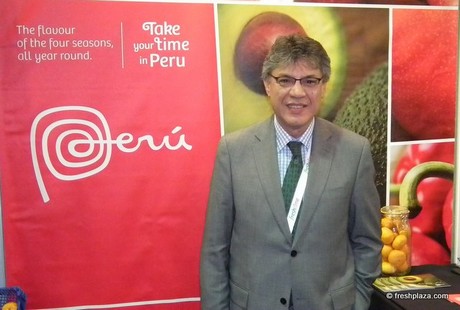 s embassy in the UK attended the first edition of the London Produce Show, held between 4 and 6 June, with the goal of showcasing what the country can offer and is already offering to the British market. “We have supplied the UK with traditional commodities such as tangerines, clementines, avocados or asparagus for a long time now, but there are new products coming, such as pomegranates and blueberries, with a great potential to develop,” affirms Jaime Cárdenas, Director of the Trade and Investment Office of the Embassy of Peru in Great Britain.
s embassy in the UK attended the first edition of the London Produce Show, held between 4 and 6 June, with the goal of showcasing what the country can offer and is already offering to the British market. “We have supplied the UK with traditional commodities such as tangerines, clementines, avocados or asparagus for a long time now, but there are new products coming, such as pomegranates and blueberries, with a great potential to develop,” affirms Jaime Cárdenas, Director of the Trade and Investment Office of the Embassy of Peru in Great Britain.Peru has a large number of agricultural companies such as Sociedad Agrícola Drokasa, Consorcio de Productores de Frutas, Complejo Agroindustrial Beta and Camposol, amoung others, which are increasing their acreage every year, and especially thanks to a number of irrigation projects finished two years ago, there is enough land in the country to supply any demand. “Growers are also becoming wiser and have started planting high-priced commodities, which is also a good sign for the future,” says Jaime.
The United States has traditionally been a great market for avocados, as it is an essential ingredient of Tex-Mex cuisine, but new markets are currently arising. According to Jaime, “a few years ago, avocados were not a popular food in other latitudes, and the U.S. does not always pay great prices, as production is seasonal. In this context, Europe, where consumption used to be almost non-existent, has become a great alternative.”
To be precise, British supermarkets such as Waitrose, Tesco, ASDA or Sainsbury now sell avocados, and this of course means that there is a market for them. “British supermarkets currently also import avocados from Spain, South Africa or Israel, which ensures a year round supply; it is a sign that they believe that their clients are adventurous with food and willing to try all kinds of international flavours,” assures Jaime.
In the end, these varying trends allow for market differentiation, and Peru will constantly look for the better prices and conditions. “If Asia, which is growing very fast, offers better conditions, our exporters will probably go there; however, the way business is done varies and we need to learn from each other. What is essential, in any case, is not to place all your eggs in a single basket,” affirms Jaime.
The biggest threat to Peruvian agriculture, above any other factor, is the weather, as “it is something that we cannot control. At the moment, the greatest concern is that the Niño will arrive, as a change of a mere two degrees Celsius could be catastrophic for the mango producers. We are not a wealthy country, so we need to invest our resources wisely to guarantee the improvement of our competitiveness and our productive infrastructures,” concludes Jaime Cárdenas.





